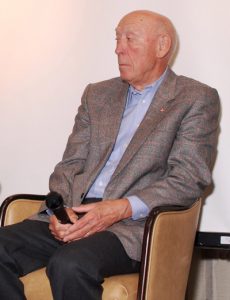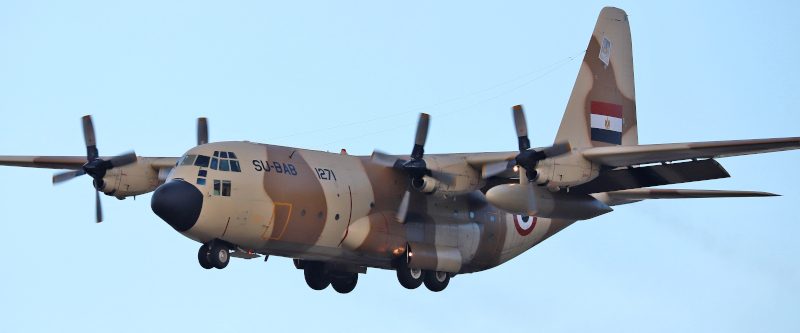Lockheed’s Egyptian Agent and the C-130
Introduction
The cover-up can be half the crime, as Lockheed amply demonstrated in the wake of a 1989 transport airplane contract with Egypt. Brought to court by U.S. prosecutors in 1995, Lockheed pleaded guilty to employing an Egyptian parliamentarian, Leila Takla, as an influence agent. The criminal investigation revealed that Lockheed had realized its employment of Takla—once she became a member of parliament—would violate the U.S. Foreign Corrupt Practices Act, and subsequently took measures to disguise her employment through a shell company. When Takla’s USD 600,000-per-plane commission was discovered by Department of Defense officials, Lockheed conspired with Takla to re-package the commission as a “termination payment.”
Key Facts
Buyer: Egypt
Seller: Lockheed Corporation (USA)
Year of Deal: 1989
Equipment Sold: 3 C-130H Hercules transport aircraft
Value of Deal: USD 78,983,575
Sum Involved in Corruption Allegations: USD 1.8 million
Dramatis Personae
Suleiman A. Nassar – regional vice president of Lockheed International; responsible for managing consultants and agents within the Middle East. Pleaded guilty to violating the Foreign Corrupt Practices Act, sentenced to 18 months imprisonment, two years of unsupervised release, and a USD 125,000 fine.
Allen R. Love – director of Middle East and North Africa sales at Lockheed Aeronautical. Pleaded guilty to a charge of providing false statements and fined USD 20,000, with three years of probation.
Leila I. Takla – member of Egypt’s parliament and its Foreign Affairs Committee; Lockheed’s agent from 1980 to 1990.
Robert McAndrew – director of international marketing at Lockheed Corp. Participated in key meetings that approved unlawful payments to Takla. Cooperated with U.S. law enforcement.
The Arms Deal
In April 1989, Egypt agreed to purchase three C-130H Hercules cargo aircraft, along with spare parts and services, at a price of USD 79 million (roughly USD 160 million in 2019, using the consumer price index). The purchase was financed by U.S. loans granted through the Foreign Military Financing (FMF) program, administered by the Defense Security Assistance Administration (DSAA), an office within the U.S. Department of Defense.
Corruption Allegations
At the time the deal was signed, Lockheed informed Egypt that no commissions would be paid alongside the deal, in compliance with Egyptian law—which required prior disclosure—and FMF requirements. Contrary to this pledge, Lockheed promised a USD 1.8 million commission payment, in the form of a USD 600,000 per plane agent’s fee, to Dr. Leila I. Takla, a member of the Egyptian parliament (the People’s Assembly), and Lockheed’s in-country consultant since 1980. Takla had previously served as a chair of the Foreign Affairs Committee of the People’s Assembly during the late 1970s, and after being re-elected to parliament in 1987 was once again sitting on the committee as a member. From 1987 to 1990, she received monthly retainer payments from Lockheed that added up to USD 129,000 over the three-year period.
According to charging documents, Takla performed several services for Lockheed that helped the U.S. aeronautics firm win the transport plane contract. First, she lobbied an unidentified U.S. congressperson to use U.S. end-user controls to prevent Israel from re-selling its transport aircraft originally purchased from the United States. Second, she provided Lockheed with specific information that undermined the Egyptian price negotiators’ bargaining position, informing the arms exporter in early April 1989 that funds had been made available for the purchase and that Lockheed should hold firm on its price quotation. She also informed Lockheed that Egypt’s lead price negotiator had been given authority to make a binding commitment. Third, U.S. prosecutors made the more general claim that Takla was induced to use her influence with the Egyptian government to ensure that Lockheed was granted the contract.
Investigations and Outcomes
The DSAA identified the USD 1.8 commission payment to Takla in November 1989, and notified Lockheed that it had informed the Egyptian government of this fact. The DSAA’s concerns about the Egyptian contract were confirmed by the Defense Contract Audit Agency in the course of a 1992 audit, during which Lockheed employees provided “misleading, incomplete, and inaccurate information” regarding the commissions.

Shortly after the DSAA’s notification, Lockheed contacted the Egyptian government and the DSAA to make clear that it would not pay any commissions on the deal. However, as U.S. prosecutors discovered, Lockheed, represented by Suleiman Nassar and Allen Love, then conspired with Takla to disguise her commission. In the first half of 1990, various Lockheed executives met with Takla and her husband, ultimately agreeing that the USD 1.8 million commission owed the agent would be cancelled and replaced with a USD 1 million “termination payment.” This would allow Lockheed to represent to Egypt and the DSAA that no commission would be paid. Senior Lockheed executives, including Kenneth Cannestra, head of Lockheed Aeronautical Systems Group, were aware of these negotiations but, while named in court documents, were not charged by U.S. prosecutors.
Lockheed’s deception began in 1987, when it transformed its consultancy agreement with Takla into a contract with a new firm, Takla Inc., set up in the name of her husband. Because Takla was now a member of parliament, she counted as a foreign official under the Foreign Corrupt Practices Act (FCPA) and Lockheed understood that continuing to directly employ her to exert influence on the Egyptian government would likely violate the statute. In April 1987, Takla wrote that her husband, as owner of Takla Inc., would be Lockheed’s agent in Egypt in her stead. U.S. prosecutors argued that she knew at the time that this would not be true.
In June 1994, the U.S. attorney’s office in Atlanta, Georgia, charged Lockheed Corp. with violations of the FCPA, defrauding the DSAA, the United States, and Egypt, wire fraud, and making false statements. Allen Love was charged with making false statements; he eventually pleaded guilty and agreed to a USD 20,000 fine and three years of probation. Nassar, formerly based in Geneva, initially failed to appear for trial and fled to Syria. He ultimately agreed to plead guilty with violating the FCPA and was sentenced to 18 months imprisonment, along with a USD 125,000 fine and two years of unsupervised release. In January 1995, Lockheed Corp. itself also pleaded guilty to one count of conspiring to violate the FCPA, agreeing to a USD 21.8 million criminal fine and an additional USD 3 million civil fine. Takla, the central figure in the conspiracy, was not prosecuted in the United States or in Egypt.
Banner Image Credit
Image Caption: An Egypt Air Force C-130H in Zaragoza, Spain, on Feb. 10, 2019.
Image Source: Flickr/Creative Commons, vic_206.
Sources (Click to Expand)
Foreign Corrupt Practices Act Clearinghouse, “Case Information: United States of America v. Lockheed Corporation, et al.,” Stanford Law School, http://fcpa.stanford.edu/enforcement-action.html?id=24.
“Visit to Dr Leila Takla (Chairman of Foreign Relations Committee of People’s Assembly of Egypt),” June 1977, (Government Papers, The National Archives, Kew, 1977), accessed April 25, 2019, http://www.archivesdirect.amdigital.co.uk/Documents/Details/FCO_93_1053.
Peter Mantius, “Lockheed, 2 execs accused of payoffs in Egyptian deal,” The Atlanta Journal and Constitution, June 23, 1994, accessed through Nexis.
Peter Mantius, “Ex-Lockheed official charged in Egyptian case called a fugitive,” The Atlanta Journal and Constitution, June 29, 1994, accessed through Nexis.
Peter Mantius, “Lockheed execs named in bribery probe,” The Atlanta Journal and Constitution, Dec. 9, 1994, accessed through Nexis.
Criminal Indictment, in United States v. Lockheed Corp., 1995, United States District Court for the Northern District of Georgia, Atlanta Division, http://fcpa.stanford.edu/fcpac/documents/3000/002003.pdf.
Superseding Criminal Information, in United States v. Lockheed Corp., 1995, United States District Court for the Northern District of Georgia, Atlanta Division, https://www.justice.gov/sites/default/files/criminal-fraud/legacy/2012/05/31/1994-06-22-lockheed-superseding-info-(lockheed).pdf.
U.S. Attorney Northern District of Georgia, “News Release,” Press Release, Jan. 27, 1995, https://www.justice.gov/sites/default/files/criminal-fraud/legacy/2012/05/31/1995-01-27-lockheed-press-release-%28plea-as-to-lockheed-love%29.pdf.

